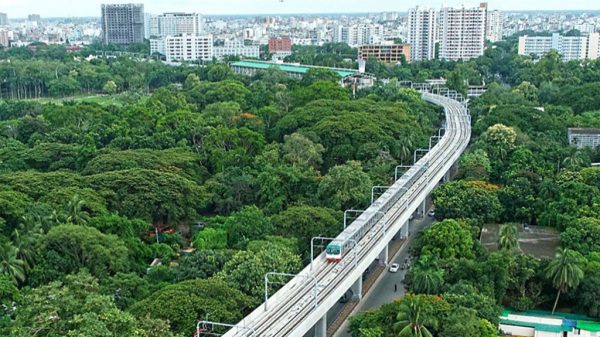Debt trap fear mounts over megaprojects

Shawdesh Desk:
The megaprojects implemented mostly with foreign loans by the now ousted Awami League regime have left the nation with concerns over the debt trap amid the questionable expected returns.
The views have been expressed in the recently released the ‘White Paper on the state of Bangladesh economy’ rebutting the Awami policymakers’ tireless trumpeting that the megaprojects were crucial for achieving high growth.
Also serious questions remained centring the quality of the governance regarding projects’ implementation, their justification, viability, costing and financing, and returns, said the white paper written by 12-member committee headed by Centre for Policy Dialogue distinguished fellow economist Debapriya Bhattacharya.
Appointed on August 29, the committee submitted its report to the chief adviser on December 1, highlighting an average loss of $16 billion annually between 2009 and 2023 owing to the illicit fund flow amid systemic tax evasion, misuse of exemptions, and poorly managed public finances under the authoritarian Awami regime ousted amid a student-led mass uprising on August 5.
Projects having financial involvement of more than Tk 10,000 crore are defined as megaprojects, according to the General Economic Division under the Planning Commission.
Bangladesh has 29 such megaprojects whose total budgeted amount stands at around Tk 7,80,000 crore, equivalent to about $87.billion.
The then Awami League-led government declared nine of these ambitious megaprojects as fast-track projects that include—Padma Multipurpose Bridge Project; Multi Lane Road Tunnel under the river Karnaphuli; Dhaka Mass Rapid Transit Development Project; Padma Bridge Rail Link Project; Dohazari to Cox’s Bazar Railway Track; Payra Deep Sea Port; Matarbari Ultra Super Critical Coal Fired Power Project.
The revised budget for these seven projects now stands at Tk 1,95,116.87 crore, seeing a massive 70.34 per cent increase from the initially estimated budget of Tk 1,14,547.56 crore.
The two other fast-track projects are Maitree Super Thermal Power Project at a cost of Tk 16,000 crore, and Rooppur Nuclear Power Plant at Tk 1,13,092.91 crore which is still being implemented.
Identifying that almost all the nine fast-track projects are underwritten by significant external borrowings, the White Paper has found that terms of borrowings are rather stringent with repayment periods of some have either started or are set to start in the near future.
‘This will entail a significant rise in the country’s debt servicing obligations,’ the White Paper says, observing that estimates regarding the returns on investment have not been done following due procedures.
The overseas debt repayment hit more than three times higher to Tk 37,307 crore in FY24 than Tk 12,018 in in FY21.
A new projection by the government’s Economic Relations Division reveals that the foreign loan repayment will grow 53 per cent to around Tk 57,800 crore in FY25 against Tk 37,775 crore in the outgoing FY24.
For an example regarding the returns on investment analysis about the fast-track projects: although the construction cost of the Karnaphuli river tunnel escalated by 26.5 per cent between the development project proforma in 2015 and revised development project proforma in 2022, there was no change in the original estimates of financial analysis that includes returns on investment estimations.
The benefit cost ratio through financial and internal rate of return and net present value remained unchanged, mentions the White Paper, adding that the way cost-benefit analysis was carried out for long-term projects is also questionable and needs a serious review.
Cost estimates were done at constant prices, while benefit estimates were carried out on the basis of nominal prices. Oftentimes, returns were estimated without consideration of the time lag in the generation of benefits, the White Paper also mentions.
Having focused on four major factors—the high construction cost, absence of competitive bidding, constraints faced by the Implementation, Monitoring and Evaluation Division in doing independent evaluation of the fast-track projects, and devaluation of local currency taka against dollars by around 39 per cent in the past two years—the White Paper forebodes that the country may fall into a debt trap if the projects fail to yield expected returns.
The paper, while analysing the overall macro-economy, observes that the country’s external debt carrying capacity has weakened due to growing exposure to foreign currency-denominated nonconcessional loans taken for the megaprojects, elevated refinancing risks, and low fiscal and external buffers.
Referring to a CPD study, it has also said that the country’s external debt carrying capacity, scaled by exports plus remittances, has indeed weakened in the recent years.
The CPD study estimated that the optimal debt to export plus remittance ratio at 124 per cent showed Bangladesh debt exceeded the threshold in FY22, said the White Paper.
Not only megaprojects but also many other projects under the annual development programme were taken causing public fund to go to waste.
Public money worth $14–24 billion was lost to political extortion, bribery and inflated budgets with the ADPs worth $60 billion in the past 15 years, according to the White Paper that blamed the Awami League for establishing the kleptocracy legacy.























Leave a Reply